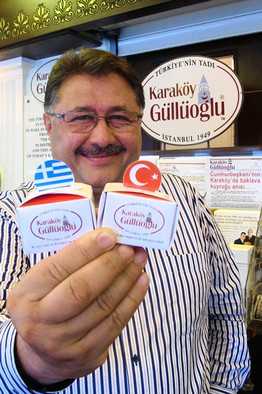 Vanessa Andris
Vanessa Andris
Leadership and Organization Effectiveness Consultant; Executive Coach, World Bank Group
It is not at all unreasonable that any intelligent person trying to make sense of Greece’s recent maniacal antics is now desperately asking, “What is this, a banana republic?”
Well my friend, no, not exactly. This is a Baklava Republic.
Welcome to a country stuck in its own syrup. A place where a prime minister, Mr. Papandreou, calls for a public referendum on a bailout deal without even notifying the finance minister who has spent months negotiating the deal with the lenders and his fellow Greek ministers. A republic where one egomaniac, Antonis Samaras, can autocratically hold an entire terrified nation and trembling world markets hostage by refusing to sign an agreement- which he publicly says he agrees to.
Greece, a country which a year ago seemed centuries ahead of the Arab Spring is now regressing so quickly into the most hideous practices of Baklava Republics that any kind of spring for them seems light years away.
The Greeks have exasperated their supporters and all but exhausted even the EU, the stakeholder with maybe the most to lose from their demise. They have displayed such primitive responses to difficulties that no one in the global community really wants to deal with them anymore.
In one year, and particularly in the last month of unpredictable counter-productive episodes, the Greeks have virtually alienated themselves from the civilized world they themselves fathered centuries ago.
If you think that what Sarkozy and Obama said about Netanyahu while their microphones were on was bad, imagine what they and the EU and IMF might rightfully be saying about the Greeks. And note the Baklava parallels between the Greek and Israeli leadership, starting with a lack of transparency and ending with complete impossibility.
Since the debt crisis began, we have watched our beloved Greece, dizzy with fatigue and despair, teetering on the fulcrum of its future, leaning first northwest like an insecure sophomore posturing to fit in with the polished seniors of the EU.
Then suddenly like all people under stress, reverting to her primal training on how to survive. Swooning now east to circle around the Mediterranean tragically re-identifying herself with cousins from ancient civilizations that have made minimal progress in their development; Turkey, Iran, Iraq, Syria, Lebanon, Israel, Palestine, Jordan, Egypt, and even Libya.
These are the Baklava Republics, a continuum of countries related by variations on one pastry, characterized by a pathetic lack of process skills, rule of law as it serves individual agendas, leaders incapable and disinterested in self-regulation, and proud of their willingness to destroy any and everything in the name of defending their dignity.
A string of countries differentiating themselves from the rest of world with a combination of primary commitment to face-saving, a need to create drama, and a defiance of reality so insanely illogical and destructive that people world-wide see them as nuts.
Not sure whether a given country could be considered a Baklava Republic? Here’s a litmus test: Are the leaders instantly insulted by anything that can be construed as questioning their honesty or good intentions? Is their best defense acting as if they have been monumentally offended? Do they regularly elevate issues to fight or flight dramas?
From Samaras to Ahmadinejad, we see the masters of Baklava Republic tactics regularly enact a predictable but no less maddening three-act drama.
Act One: Outrage: A question about duplicitous behavior is met with incredulous anger; “You dare to question me?”
Act Two: Arrogance: “You have insulted me and anyone who would be so ill-mannered is so far beneath me that they are unworthy of my cooperation.”
Act Three: Threat: “I am a victim, rightfully volatile now because of your behavior. Either provide me a face-saving way to get out of this or I will sabotage this process, set fire to the whole country, commit mass invasions, and/or make my child a suicide martyr. It’s dignity or death.” (Additional Baklava Republic specialty: Add concocted conspiracy theory and implication that the alleged perpetrator is evil, sinful, or crazy to Act Two).
When I recently suggested a commonality among these countries to a senior IMF economist who had told me that Greece’s books were in worse shape than those of a Third World country, the idea of a geographic region of Baklava Republics was immediately dismissed. “No. Turkey is doing quite well.”
Huh? Boy does Ergodan have you right where he wants you…and right where the Greeks had you when they and you wanted them to join the EU.
Turkey under Ergodan has become the most sweetly disguised of the Baklava Republics. The reason that the world assumes Turkey has evolved from being a banana or Baklava state is because Ergodan controls the media, and therefore, in true face-saving fashion, manipulates the profile of Turkey that the outside world sees.
But once you cut through the honeyed layers, you see that Ergodan’s autocratic domination and disregard for rule of law is only degrees different from that of Gaddafi, Mubarak, Assad, Hussein, Ahmadinejad, and Samaras; just better polished to look more politically correct. In some countries Baklava is made with walnuts; in others pistachios or almonds. But nut varieties aside, baklava is baklava.
Park for a moment the notions that Ergodan has sold the world through his public relations campaign and ask three citizens on the streets of Istanbul what they think about Ergodan. All will tell you what they told me:
“We are afraid of him. Every day he is increasingly limiting the rights of individuals. Ergodan rule is replacing the rule of law with whatever suites his agenda from Islam tradition and his own ambitions. He is embedding human rights violations into our culture and using intimidation to prevent us from speaking up. Internet is controlled. He has been holding hundreds top level journalists, academics, and scientists in jails for over a year without even charging them.”
If that is not enough to convince you that Ergodan is deceiving world powers or seducing them enough to collude with him about the validity of his economic standing for their own purposes (one of which Greece did with the EU), here is the clincher I hear repeatedly from Turkish citizens: “Don’t believe that our economy is booming. Ergodan makes up the numbers, releases them to the press he controls, and here in Turkey things are not good.”
Independent data confirms that Turkey is not only not above any of the Baklava Republics but may be one of the worst. Asli Gurkan of the World Bank writes, “Despite Turkey’s successes in macroeconomic stability and poverty-reduction, the participation of women in economic life is abysmal. Turkey was among the lowest scoring countries in the 2010 World Economic Forum Gender Equality Gap Report and scored 126th out of 134th in the UNDP Gender Inequality Index. What is more worrisome is that women’s economic participation rates have been declining in the last decade.”
Research on domestic violence and violence against women in Turkey by the General Directorate of the Status of Women states that 41.9 percent of the women in Turkey face physical and sexual violence, 49.9 percent of women in lower income groups are being victimized and 28.7 percent in higher income families.
Last week Turkey’s parliament became the first national assembly to ratify the new Council of Europe “Convention on preventing and combating violence against women and domestic violence.” Now let’s hope that signing a treaty actually translates into change.
Turkey also needs to demonstrate greater respect for human right related to religious tolerance. After expressing concern about restrictions on freedom of expression, U.S. Vice-President Joe Biden, visiting Turkey this week stated that the continued closure of the Halki Theological School that trained generations of Greek Orthodox patriarchs “is an anomaly and an unnecessary mark against Turkey’s international image.”
The best that can be said about Turkey now is that it is in a state of opportunity with a leader who is competent in managing both internal and external affairs. Whether Ergodan will bring integrity to the image of Turkey he is projecting or just continuously improve his skill at hiding the truth remains to be seen.
On the other side of the Aegean, the only thing left separating Greece from the rest of the Baklava Republics is that Greece is not yet guilty of a history of violating human rights. Perhaps this is a line that the fathers of democracy can never cross. But if Greece does not remain in the EU and basic resources become acutely scarce, as may now be inevitable EU or no EU, the impulse to manage desperately violent people by means bordering on human rights violations will surface.
Time will tell if this will happen and if even approaching this boundary of behavior will shock the Greeks into gaining some self-control. Or if, since we are talking baklava, why bother avoiding the obvious metaphor, Greece will crumble into bite-size morsels to be eaten by duplicitous Turkey and others awaiting her demise.

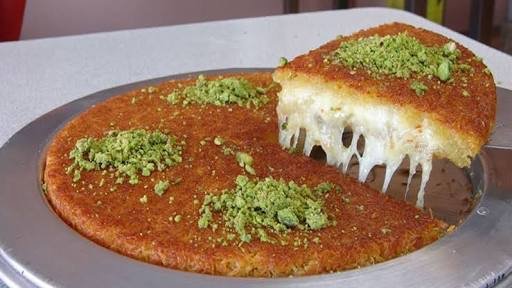



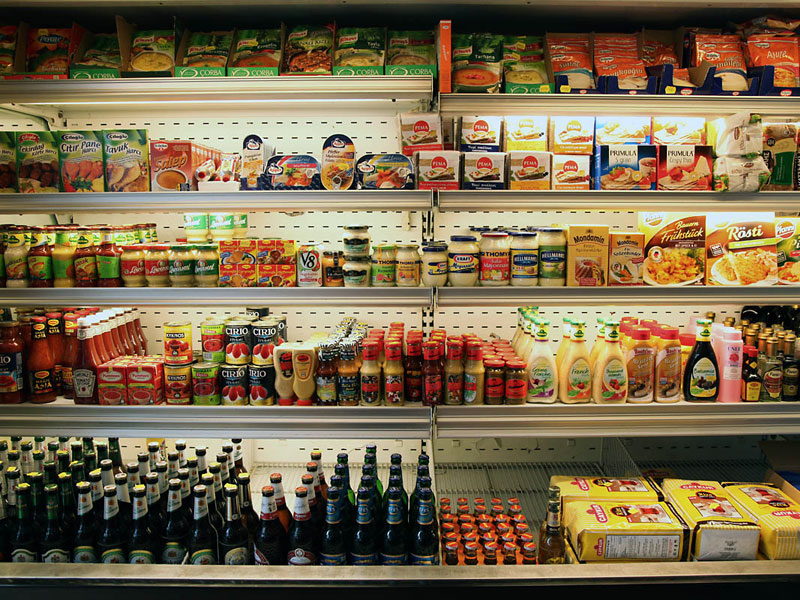

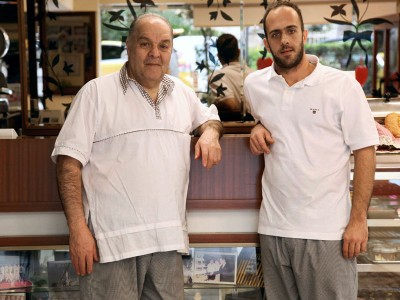 church after the memorial service for the departed; of course, wheat could be found in Greece, but the Constantinopolitans didn’t like it. Meanwhile, roses from Istanbul are edible and were used to make a superbly aromatic gül reçeli(rose jam).
church after the memorial service for the departed; of course, wheat could be found in Greece, but the Constantinopolitans didn’t like it. Meanwhile, roses from Istanbul are edible and were used to make a superbly aromatic gül reçeli(rose jam). take over. They were born and raised in Greece; they go to Istanbul only as tourists, carrying the memories of their parents and grandparents of an era that has been irreversibly lost,” Kostas Lemoncoğlu says.
take over. They were born and raised in Greece; they go to Istanbul only as tourists, carrying the memories of their parents and grandparents of an era that has been irreversibly lost,” Kostas Lemoncoğlu says.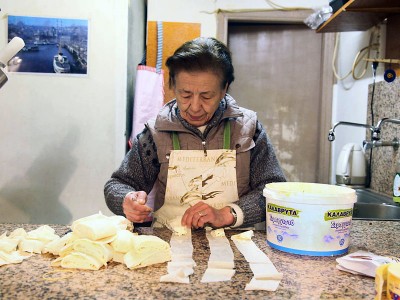 including taramasalata (fish roe dip), savory pie made with pastırma, and yalancı dolma (rice-stuffed grape leaves); her silky baba ghanoush (eggplant dip), with its distinctive charred flavor, is renowned.
including taramasalata (fish roe dip), savory pie made with pastırma, and yalancı dolma (rice-stuffed grape leaves); her silky baba ghanoush (eggplant dip), with its distinctive charred flavor, is renowned.
